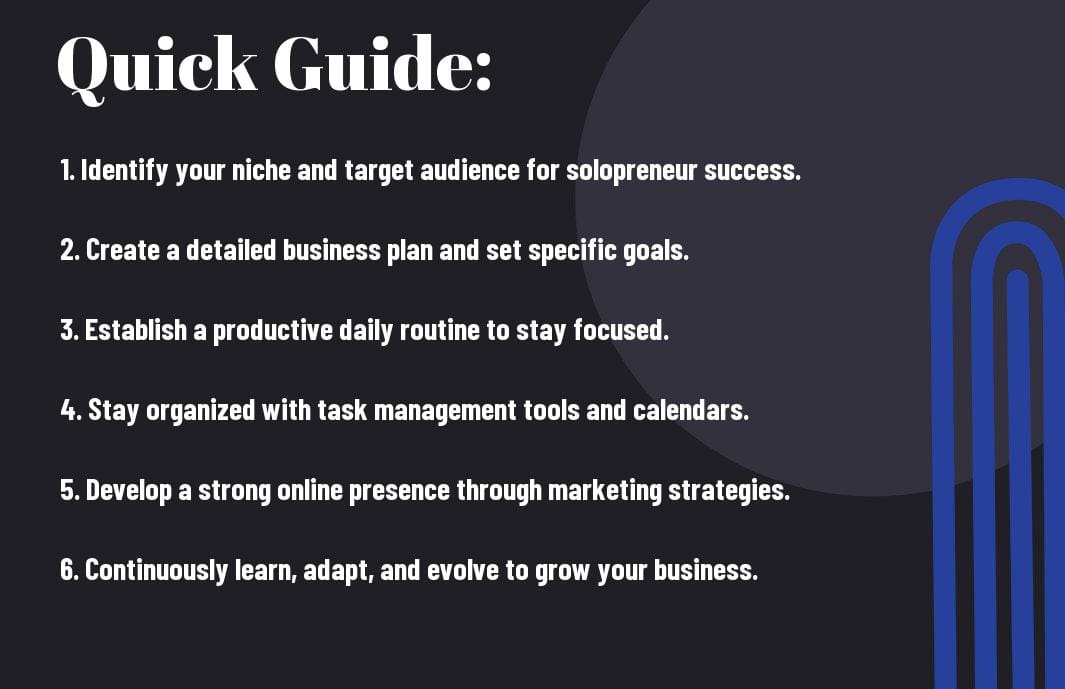Solopreneurship can be a rewarding journey, but it also comes with its unique set of challenges. In this comprehensive guide, we will probe into the strategies and techniques that can help you thrive as a solopreneur and boost your productivity. From time management tips to effective goal setting, this guide covers everything you need to know to succeed as a solopreneur. Learn how to overcome the isolation that can come with working alone, harness the power of self-discipline to stay focused, and leverage technology to streamline your workflow. Whether you’re just starting out on your solopreneur journey or looking to take your existing business to the next level, this guide is your go-to resource for becoming a productive and successful solopreneur.
Key Takeaways:
- Time Management is Crucial: As a solopreneur, managing your time effectively is necessary to staying productive. Create a schedule, prioritize tasks, and eliminate distractions to make the most out of your day.
- Invest in Personal Development: Continuously improving your skills and knowledge is key to success as a solopreneur. Take courses, attend workshops, and stay updated with industry trends to stay ahead in your field.
- Outsource When Needed: Don’t hesitate to delegate tasks that are not within your expertise or consume too much of your time. Outsourcing certain aspects of your business can free up your time for more important tasks and help you focus on growing your business.

Types of Solopreneurs
Assuming you are considering a journey into the world of solopreneurship, it is necessary to understand the different types of solopreneurs you can become. Below, we will explore three main categories of solopreneurs to give you insights into the diverse opportunities available in this entrepreneurial realm.
| Digital Nomads and Content Creators | E-commerce Entrepreneurs |
| Consultants and Freelancers |
Digital Nomads and Content Creators
There’s a growing trend of solopreneurs who embrace the digital nomad lifestyle, leveraging technology to work remotely and create engaging content across various online platforms. These solopreneurs prioritize flexibility, creativity, and the freedom to work from anywhere in the world.
E-commerce Entrepreneurs
Clearly, e-commerce entrepreneurs are thriving in the digital age, leveraging online platforms to sell products or services directly to consumers. These solopreneurs manage online stores, handle marketing strategies, and ensure seamless transactions to build successful e-commerce ventures.
Solopreneurs in the field of e-commerce benefit from the global reach and scalability of online businesses but also face challenges such as intense competition and the need to stay updated with the latest trends and technologies in the industry.
Consultants and Freelancers
An increasing number of solopreneurs are choosing to offer their expertise as consultants or freelancers in various industries. These solopreneurs provide specialized services to clients, offering their skills on a project basis or through ongoing contracts.
Types of consultants and freelancers range from marketing specialists and graphic designers to IT consultants and business coaches. Solopreneurs in this category enjoy the autonomy of choosing their projects and clients but must continuously market themselves and deliver high-quality services to stand out in a competitive market.

Step-by-Step Guide to Starting as a Solopreneur
| Identifying Your Niche and Unique Value Proposition | Creating a Business Plan and Setting Goals |
| Short text for identifying niche and UVP | Short text for creating a business plan and setting goals |
Identifying Your Niche and Unique Value Proposition
Identifying your niche market is crucial for solopreneurs. Determine what sets you apart from competitors by defining your Unique Value Proposition (UVP). Your UVP is what differentiates your business and attracts your target audience.
Creating a Business Plan and Setting Goals
Starting as a solopreneur requires a clear business plan and defined goals. Set specific, measurable, achievable, relevant, and time-bound (SMART) goals to guide your business growth. Your business plan should outline your objectives, target market, competition analysis, financial projections, and marketing strategies.
Value: A well-defined business plan and clear goals provide a roadmap for your business, enabling you to make informed decisions and track your progress effectively.
Setting Up Your Business Structure and Legalities
Unique
Structure: .
Building Your Brand and Online Presence
Structure
Guide: .
Tips for Increasing Productivity as a Solopreneur
Now, as a solopreneur, it’s crucial to find ways to increase your productivity and efficiency. By implementing the right strategies, you can maximize your output and achieve your business goals more effectively. Here are some key tips to help you boost your productivity as a solopreneur:
Time Management and Prioritization
One of the most important skills for a solopreneur is effective time management and prioritization. By setting clear goals, creating a schedule, and prioritizing tasks based on importance and deadlines, you can focus on what truly matters and avoid getting overwhelmed.
Leveraging Automation and Outsourcing
One effective way to increase your productivity as a solopreneur is by leveraging automation tools and outsourcing tasks that are time-consuming or outside your expertise. By automating repetitive tasks and delegating non-core activities, you can free up more time to focus on growing your business and generating revenue.
Tips: Consider using project management tools, virtual assistants, and software automation to streamline your workflow and save time.
The Importance of Self-Care and Maintaining Work-Life Balance
One common pitfall for solopreneurs is neglecting self-care and work-life balance in pursuit of business success. It’s necessary to prioritize your health and well-being to avoid burnout and maintain your productivity over the long term. Make time for activities you enjoy, exercise regularly, and set boundaries between work and personal life.
Networking and Building Professional Relationships
Leveraging your professional network is crucial for a solopreneur to grow their business and access new opportunities. By networking with industry peers, potential clients, and mentors, you can gain valuable insights, collaborations, and support that can drive your business forward.
Productivity: Building strong professional relationships can lead to referrals, partnerships, and valuable connections that can boost your business growth exponentially.
Factors for Solopreneurial Success
Unlike traditional entrepreneurs, solopreneurs have a unique set of factors that contribute to their success. Understanding these factors is crucial for navigating the complexities of running a business single-handedly.
Critical Skills and Continuous Learning
Some of the critical skills for a solopreneur include time management, decision-making, and effective communication. Continuous learning is imperative to stay ahead in the ever-evolving business landscape.
Adaptability and Resilience
Adaptability is a key trait that distinguishes successful solopreneurs from the rest. Being able to pivot quickly in response to changing market trends and setbacks is crucial for long-term success.
This ability to bounce back from failures and challenges is what sets resilient solopreneurs apart. They understand that setbacks are a part of the journey and use them as opportunities to learn and grow.
Financial Planning and Management
Factors such as budgeting, cash flow management, and investment decisions play a critical role in the financial success of a solopreneur. Having a solid financial plan in place is imperative for sustainable growth.
The ability to make sound financial decisions and manage resources efficiently can make or break a solopreneur’s business. It’s important to prioritize financial planning and management to ensure long-term success.
The Pros and Cons of Being a Solopreneur
| Pros | Cons |
| Flexibility in work hours | Isolation |
| Complete control over decision making | Accountability solely rests on the solopreneur |
| Ability to pursue personal passions | Long working hours |
| Potential for unlimited earning | Managing all aspects of the business alone |
| No conflicts with business partners | Feeling overwhelmed by responsibilities |
Evaluating the Benefits of Independence and Flexibility
Benefits: Solopreneurs have the freedom to set their schedules and work from anywhere, allowing for a better work-life balance. They can make quick decisions without having to consult anyone, enabling agility in their business operations.
Addressing the Challenges of Isolation and Accountability
Assuming: Solopreneurs may experience feelings of isolation as they lack co-workers to bounce ideas off or share the workload. Additionally, being solely accountable for the success or failure of the business can be daunting and stressful.
Challenges: It is vital for solopreneurs to actively seek out networking opportunities to combat feelings of isolation. Creating a support system of mentors, fellow entrepreneurs, or joining professional groups can help combat this challenge. Additionally, implementing efficient time management strategies and setting clear goals can alleviate the burden of sole accountability.
The Conclusion
The journey of becoming a productive solopreneur is filled with challenges and opportunities for growth. By following the steps outlined in this definitive guide and embracing the mindset of a solopreneur, you can set yourself up for success in your entrepreneurial endeavors. Remember to prioritize time management, self-care, and continuous learning to stay productive and inspired. With dedication, perseverance, and a clear vision, you can thrive as a solopreneur and achieve your goals. Here’s to your success as a productive solopreneur!
FAQ
Q: What is a solopreneur?
A: A solopreneur is an entrepreneur who runs their business alone, without any employees. They handle all aspects of the business, from product development to marketing, on their own.
Q: What are some tips for becoming a productive solopreneur?
A: Some tips for becoming a productive solopreneur include setting specific goals, creating a daily schedule, prioritizing tasks, staying organized, taking breaks to avoid burnout, and continually learning and improving your skills.
Q: How can I balance work and personal life as a solopreneur?
A: Balancing work and personal life as a solopreneur is crucial for overall well-being. Some strategies to achieve this balance include setting boundaries, scheduling time for yourself and loved ones, outsourcing tasks when possible, and practicing self-care activities such as exercise and mindfulness.




